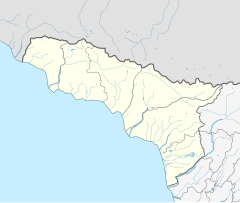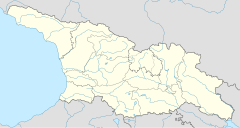| Anukhva church ანუხვის ეკლესია (in Georgian) | |
|---|---|
| Religion | |
| Affiliation | Georgian Orthodox |
| Province | Abkhazia |
| Ecclesiastical or organizational status | ruins |
| Location | |
| Location | |
  | |
| Geographic coordinates | 43°07′20″N 40°50′00″E / 43.12222°N 40.83333°E / 43.12222; 40.83333 |
| Architecture | |
| Type | Church |
| Completed | 11th century |
The Anukhva church (Georgian: ანუხვის ეკლესია, romanized: anukhvis ek'lesia) is a ruined medieval church on the right bank of Psirtskha river at the village of Anukhva in Gudauta District in Abkhazia, a breakaway region of Georgia. It is located in the hills immediately south of the town of New Athos, at the Black Sea coastline.
History
Only a pile of ruins survives of what appears to have been a hall church with a protruding apse and tiled roof. Several pieces of ornate masonry, some adorned with medieval inscriptions, have been retrieved from the site at various times and brought for safekeeping to a museum in Sokhumi. One artifact, a limestone slab of the altar screen measuring 78 x 73 x 10.5 cm, bears the image of an equestrian St. George slaying the prostrate emperor Diocletian—a recurrent scene in the medieval Georgian art—and is dated to the 10th-11th centuries. Another slab, measuring 76 х 78 cm, depicts the Crucifixion with the accompanying Greek and Georgian inscriptions. A part of the base of the limestone altar cross, measuring 28 x 100 x 20.5 cm, is decorated with an ornate cross and a Georgian inscription in the asomtavruli script, dated to the 11th century. It mentions the certain George, son of Basil (Giorgi Basilis-dze), and members of his household, who had installed the cross in the church. Other artifacts found at the site include an ornate column of the altar screen and a lead ring with the inscribed Georgian text addressing to "Saint George, of the Monastery of Anakhvi".
Notes
- The political status of Abkhazia is disputed. Having unilaterally declared independence from Georgia in 1992, Abkhazia is formally recognised as an independent state by 5 UN member states (two other states previously recognised it but then withdrew their recognition), while the remainder of the international community recognizes it as de jure Georgian territory. Georgia continues to claim the area as its own territory, designating it as Russian-occupied territory.
References
- Church in Anukhva village Historical monuments of Abkhazia — Government of the Autonomous Republic of Abkhazia.
- Iamanidzé, Nina (2010). Les installations liturgiques sculptées des églises de Géorgie (VIe-XIIIe siècles) (in French). Turnhout, Belgium: Brepols. p. 154. ISBN 978-2-503-53408-4.
- Endoltseva, Ekaterina (2019). "Архитектурная пластика Абхазского царства (VIII–XI вв.): Из коллекции Абхазского государственного музея" [Architectural decoration in Abkhazian Kingdom (8‒11 centuries). From collection of the state Abkhazian museum in Sukhum]. St. Tikhons' University Review. Series V. Christian Art (in Russian). 33: 9–30. doi:10.15382/sturV201933.9-30. S2CID 198531116.
- Bgazhba, Khukhut Solomonovich (1967). Из истории письменности в Абхазии [From the History of Writing in Abkhazia] (PDF) (in Russian). Tbilisi: Metsniereba. pp. 15–16.
- Kapanadze, Salome, ed. (2007). Georgian Cultural Heritage. Book1. Abkhazeti. Tbilisi: Ministry of Education and Culture of Abkhazia. pp. 104–106.
- Khroushkova, Liudmila (2006). Les monuments chrétiens de la côte orientale de la Mer Noire: Abkhazie, IVe-XIVe siècles (in French). Brepols. p. 154. ISBN 2503523870.
- Vinogradov, Andrey Y.; Beletsky, Denis V. (2015). Церковная архитектура Абхазии в эпоху Абхазского царства. Конец VIII — X в. [Church architecture of Abkhazia in the period of the Abkhazian Kingdom. End of the 8th-10th centuries] (in Russian). Moscow: Indrik. ISBN 978-5-91674-365-4.